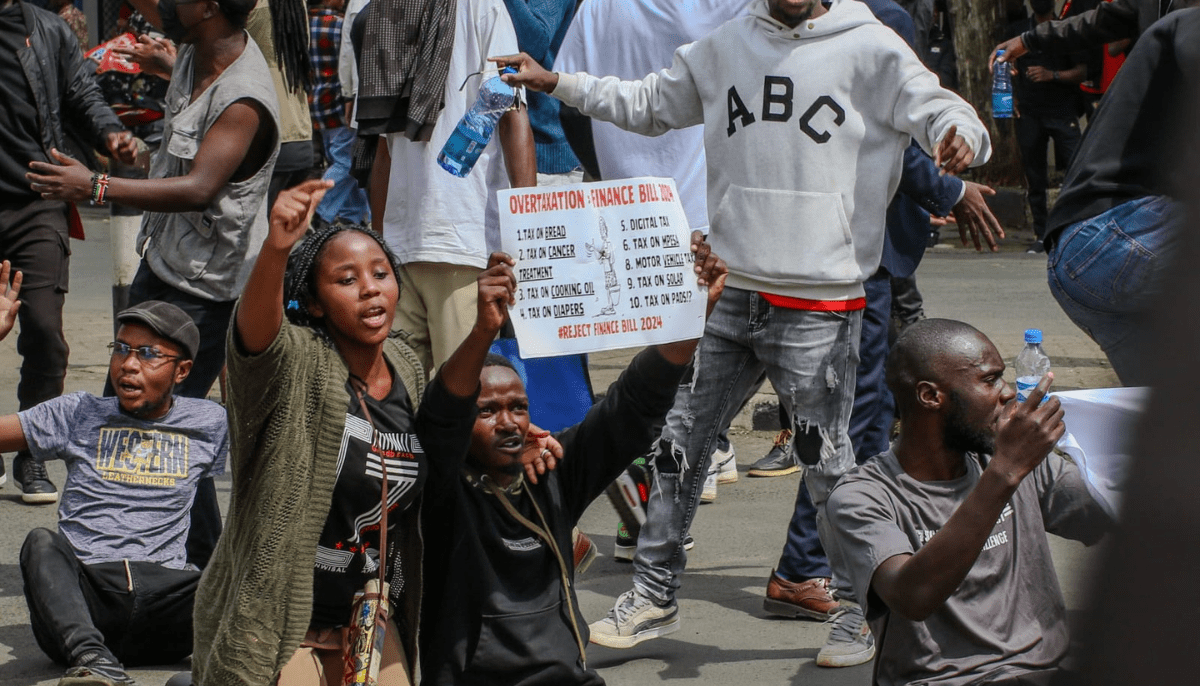A Summary of Events
Tuesday, 18th June 2024: The first round of protests against the Finance Bill 2024 begins with numerous protestors turning up.
Thursday, 21st June 2024: Second round of protests that attract larger crowds from various parts of the country
Friday, 22nd June 2024: A program indicating the activities lined up by the protestors dubbed 7 Days of Rage is released.
Tuesday, 25th June 2024: The largest group of demonstrators came out in 35 counties across the country.
So, Who was protesting (and Why)?
Many people have labeled this a Gen-Z fight, but the truth is that plenty of millennials have been at the forefront. The seasoned human rights defender and photographer Boniface Mwangi (40 years) and Shadrack Kiprono (aka Shady, 35 years) are two of the older faces associated with the ‘tribeless, leaderless, and partyless’ movement. What sets this movement apart from so many before it is its unity of purpose. Since the first round of protests, their objective has been one: #RejectFinanceBill2024.
The movement has also been spurred by X (formerly Twitter). The social media platform has formed the base of resistance, with much of the communication and logistical planning happening there. It has also been a powerful mobilization tool, as evidenced by the call for donations to support the families of the first two victims of the protest, Rex Masai and Evans Kiratu. The call was honored, and organizers were able to raise 2 million shillings in about 5 hours.
“If you think tribalism is our biggest threat then wait until the young, unemployed populace get hungry and angry! That will be the day.” @SheilaBirgen on X
Sheila’s statement on X encapsulates part of the current situation in the country. The youth are both hungry and angry. Unemployment levels are through the roof, and to compound matters, the current government has been on a relentless mission to raise revenue, resulting in overly aggressive tax policies. The government insists that these measures are necessary to reduce the country’s debt distress.
However, Kenya’s debt situation is just part of the problem (at least according to Kenyans). Whatever issues we face as a country are exacerbated by the government’s unnecessary expenditure, waste, and corruption that, if resolved, would greatly aid in managing the country’s affairs. To help paint a picture, the president’s travel budget for the first nine months of the 2023/2024 financial year was 18 billion shillings (USD 139.3 million). It was 14 billion for a similar period during the previous financial year (USD 108.3 million). 32 billion shillings is the amount that was spent to construct the Thika Super Highway. The president is also pushing to legalize the position of Chief Administration Secretary (CAS), which is not recognized under the Constitution and presents yet another avenue for unnecessary expenditure in what appears to be a move to reward loyalties. This year’s Appropriation Bill (which basically tells us where taxpayer monies will go) indicates that the Office of the President will get 4.2 billion shillings,
For a movement without a leader, the levels of coordination have been frighteningly accurate. So good has been the coordination that on Tuesday, 25th June, protests were synchronized across 35 counties. while 4.5 billion and 8 billion will be directed to the office of the Deputy President and State House, respectively. Another unconstitutional office – Prime Cabinet Secretary - will get about 1.2 billion.
So, it pains the youth to see, hear, and read stories of corruption, and a few people benefitting from it should ideally be meant for everyone. It hurts even more when people put in positions where they are meant to represent your interests end up advancing their selfish causes or those of their “superiors.” Still, it hurts when people take what is yours and spit on your face through ostentatious and unethical displays of wealth. But what perhaps hurts the most is that there seems to be no punishment for failing the citizens. By contrast, they are rewarded by systems that they have set up to protect themselves.
All the anger and hunger came to a head on Tuesday, 25th June, when Parliament was invaded, and people went to the kitchen to fill their empty stomachs.
Regardless of what follows next, two things are evident: the fearless youth are a force to be reckoned with, and Kenya will never be the same again.
For more insights on media law, please contact Wahome Wilson at wahome@gwrifa.com or info@gwrifa.com




